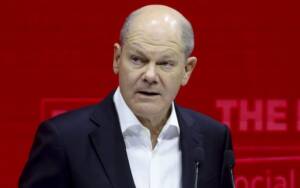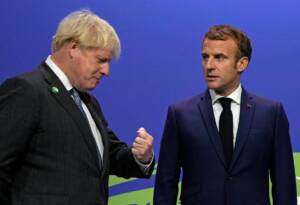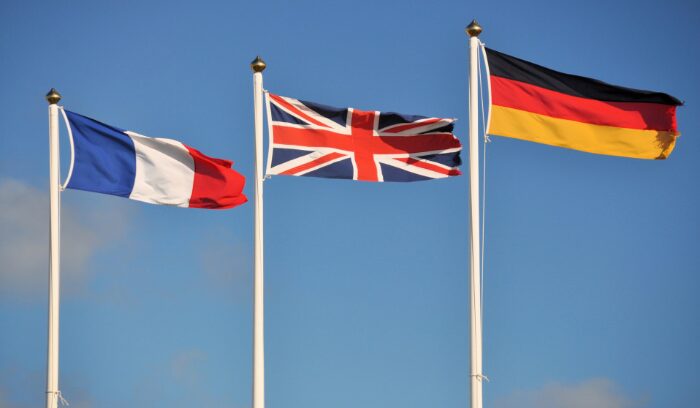Olaf Scholz has the appearance of an eternally confused man but he took the strong stance of not fanning the Ukrainian fire anymore and suddenly the Bonnie and Clyde of NATO that is the UK and France are playing evil games to undermine Germany.
The discussion initiated by French President Macron about the possibility of NATO’s conventional involvement in Ukraine highlighted two opposing perspectives within Europe. France, along with the Baltic States and Poland, supports the idea of “non-combat deployments” for tasks such as demining and training, which could be implemented by a “coalition of the willing”. In contrast, the majority of the group aligns with Germany’s view that such actions should be avoided at all costs.

Join us on Telegram: https://t.me/tfiglobal
The incident referred to as “Scholz’s Slip of The Tongue” unintentionally disclosed that British and French troops are already in Ukraine assisting with “target control”. A leaked recording from the Bundeswehr regarding the bombing of the Crimean Bridge further revealed American involvement. Despite this, what Paris proposes is to officially recognize these deployments and to incrementally increase them in a “non-combat” role.
France and Baltic Minnow states aim to prepare for a potential eastward advance to protect Ukraine, contrasting Germany’s neutrality and focus on strengthening Europe’s defense with US support, including a “military Schengen” for enhanced military mobility. Baltic States and Poland fear engagement with Russia without nuclear power backing, viewing France’s involvement as crucial for deterrence. The UK, aligned with NATO efforts, could actively support Ukraine, possibly independently of the US. France’s exclusion from the “military Schengen” limits its deployment capabilities, but it could join or form similar agreements to enhance its strategic position, with Romania’s “Moldovan Highway” offering a new military route. The development of a Greek-Ukrainian corridor highlights its importance for supporting Ukraine and counterbalancing Germany’s influence. France seeks to expand its influence through a security agreement with Moldova and collaborations with Romania, Bulgaria, and Greece, potentially deploying military trainers. The UK could also enhance its presence in Eastern Europe, possibly leading to direct military involvement in Ukraine.
Read More: France, Germany and The UK are racing to get out of RUSSIA’s WAY
The prospect of France and the UK proceeding with this intervention, either with US approval or as a unilateral action by a “coalition of the willing,” could compel Germany to join in order not to appear weak. Past actions, such as the deployment of missiles to Ukraine, suggest a precedent for Germany feeling pressured to participate.
Although it may seem counterintuitive for France and the UK to want German participation in this intervention, given their intent to curb Germany’s power resurgence, there is a strategic rationale. Increased German involvement could diminish the chances of a post-conflict reconciliation with Russia, which some fear, and potentially overextend Germany’s military and strategic capacities. This scenario could provide opportunities for France and the UK to reduce Germany’s influence in the Balkans and Baltics, respectively.

However, if Germany chooses to remain neutral while France and the UK face negative outcomes from their involvement, Germany could emerge in a stronger position, potentially discrediting the interventionist approach. This outcome could validate Germany’s strategy and accelerate the construction of “Fortress Europe” without the challenges posed by France and the UK.
Read More: “EU is BROKE”, declares EU’s Foreign Affairs and Security Policy Chief
Conversely, a successful intervention by France and the UK could challenge Germany’s position, especially if it leads to a significant impact on the conflict in Ukraine. This scenario could reshape the power dynamics within the EU, with the US relying on a broader set of allies to prevent any single country from dominating the bloc.
The plans for Western intervention in Ukraine, led by France and the UK, are still forming, and their implementation remains uncertain. The US’s stance will be crucial, as it may either lead the intervention or prefer to support from behind to avoid escalating tensions. The situation underscores the complex dynamics and strategic calculations at play among Western allies regarding their involvement in Ukraine.








